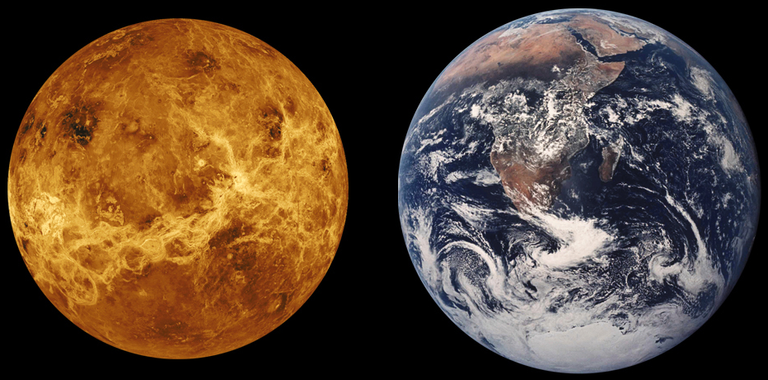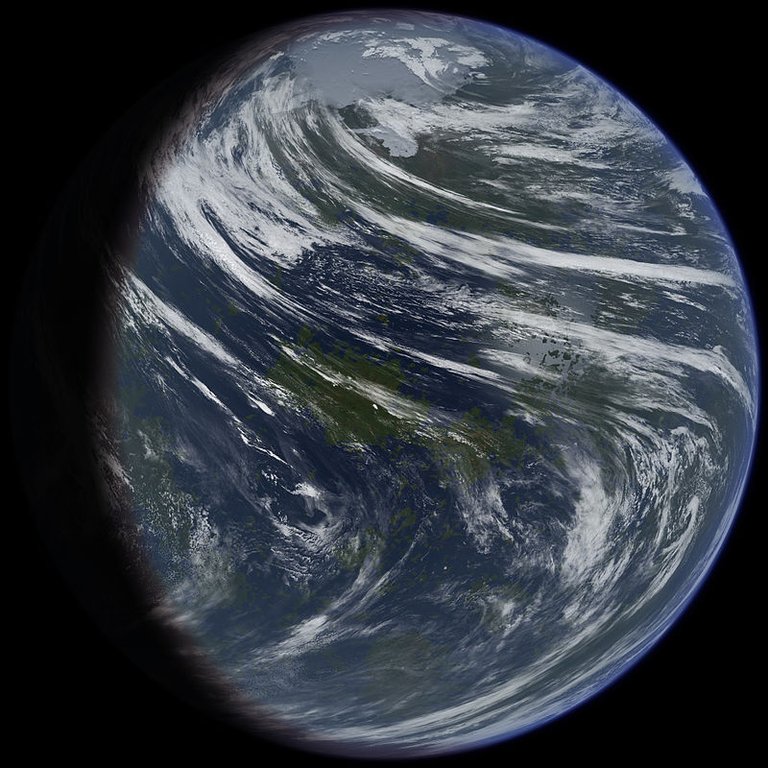Colonization of Venus
The colonization of the planet Venus, Earth's next planetary neighbor, has been frequently discussed in the past. After discovering and investigating the hostile surface conditions (extremely dense CO2 atmosphere, almost 500 ° C), the discussion of colonies outside the Earth has shifted mainly to the Moon and Mars. In new approaches, the colonization is to be relocated, inter alia, in the cloud cover of the planet.

There are different arguments for the Venus colonization.
The arguments for the Venus colonization are:
1.Venus is most similar in mass and size to the Earth. Its surface gravity is 0.904 g and is therefore comparable to the earth (Earth 1g) . Venus colonization could prevent the health effects of weightlessness or low gravity.

2.Sufficient solar energy can be generated of solar radiation, which is 1.9 times the amount of solar radiation on earth. The clouds reflect a large part of it, so you could direct solar panels to the sun as well as to the planet's surface to generate electricity.
3.Aside from the moon, Venus is Earth's next celestial body, which would facilitate communication with the colony and transportation. A launch window between Earth and Venus opens every 584 days, compared to 780 days at Earth-Mars. At the closest approach Earth and Venus have a distance of 45 million km, Earth and Mars 56 million km.
Arguments against the colonization of the Venus are:
1.The surface conditions of Venus are extremely hostile to life. Temperatures are around 500 degrees Celsius near the equator, enough to melt lead. The atmospheric pressure at the bottom is 90 bar, equivalent to the pressure in one kilometer of water. These conditions resulted in the space probes Venera 5 and Venera 6 being crushed 18 and 10 kilometers above the ground, respectively. Venera 7 and 8, following them, reached the surface, but both worked less than an hour. As a result, transport of materials from the surface, such as raw materials, would be difficult.
2.Water is almost completely missing on the planet. The atmosphere has no molecular oxygen, but consists of toxic concentrations of carbon dioxide and clouds of sulfuric acid and sulfur dioxide vapors.
3.The biggest problem is probably the extremely slow rotation of Venus. A sunny day on Venus is 117 earth days long. In a thinner atmosphere after terraforming, the daytime would heat up a lot and cool down the night side. Large amounts of water would evaporate on the day side and the clouds would be driven by gigantic hurricanes on the night side and rain there. A rotation acceleration required thereby would require enormous energy requirements
Methods of colonization:
To solve this problems one method are: Floating Cities
Geoffrey A. Landis suggested avoiding the surface's difficulties by allowing the colonies to float in the atmosphere, much like hot air balloons or zeppelins. The starting point here is that the breathing air (78% nitrogen, 21% oxygen) is lighter than the Venus atmosphere.
Terraforming of Venus:
Robert Zubrin proposed , a solar shield which, simply explained, casts a shadow and thereby cools the planet to stretch in front of Venus, to cool the amotsphere down to 216.85 Kelvin.Below this point the CO2 resublimates and settles on the surface as dry ice. This dry ice would then either be disposed of or transported to Mars (to speed up its terraforming). This would solve the problems of heat, greenhouse effect and air pressure, but Zubrin must admit that the lack of water continues to be a serious problem could not be solved satisfactorily even by bombardment from comets. Birch suggests throwing one of Saturn's moons out of orbit and bombarding Venus with its fragments, resulting in a volume of 100 liters of water per square meter.
Landis also suggested combining colonization with floating cities and building a solar shield so that direct colonization in the near future and terraforming of Venus would later go hand in hand. These solar shields could even consist of carbon nanotubes, whose raw material carbon could be obtained directly from the air

What do you think ?
Is the colonization of the Venus a good idea or are other planets better?
Share your opinion in the comments, please
Congratulations @factfactory! You received a personal award!
Click here to view your Board
Congratulations @factfactory! You received a personal award!
You can view your badges on your Steem Board and compare to others on the Steem Ranking
Vote for @Steemitboard as a witness to get one more award and increased upvotes!